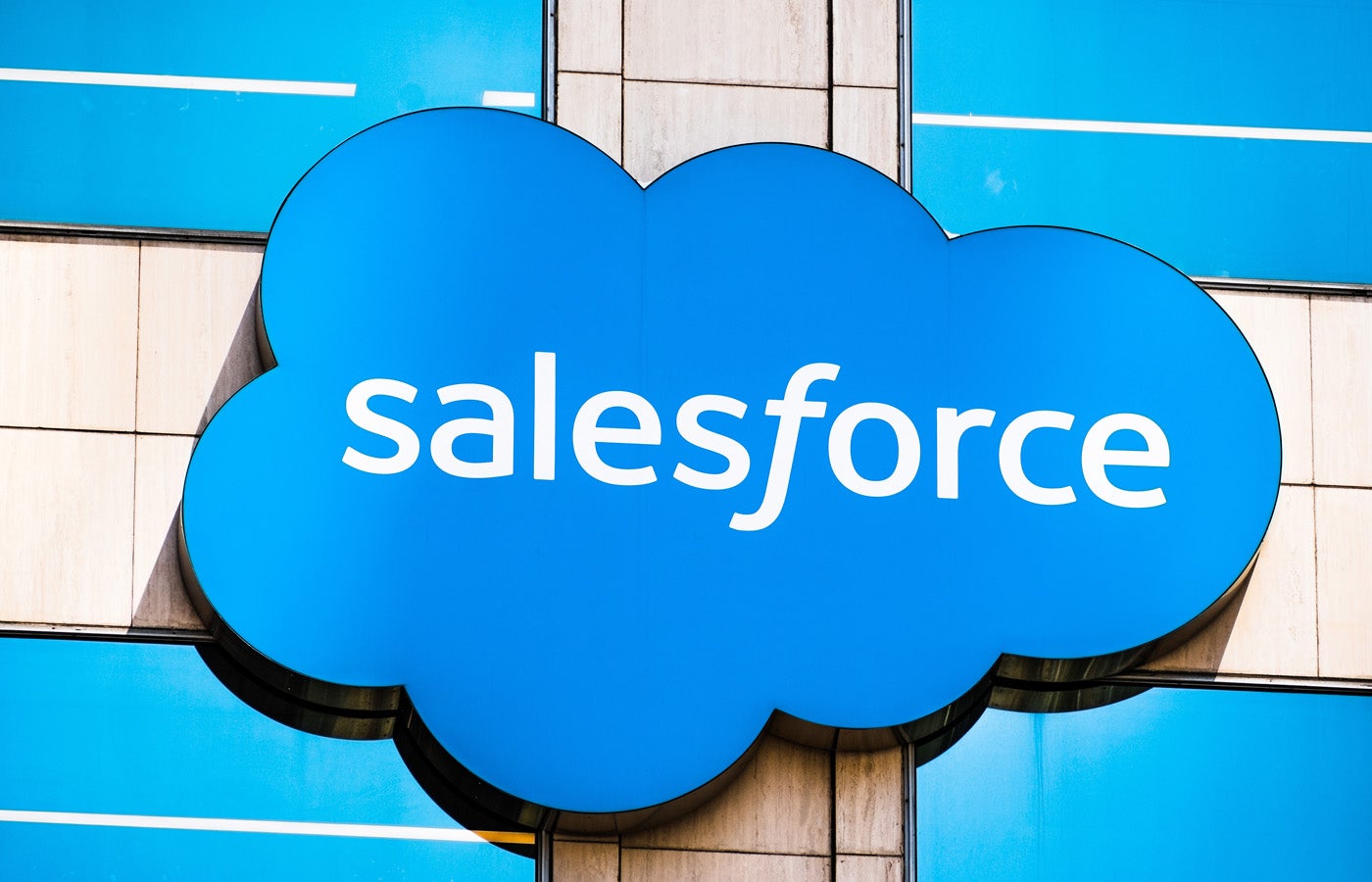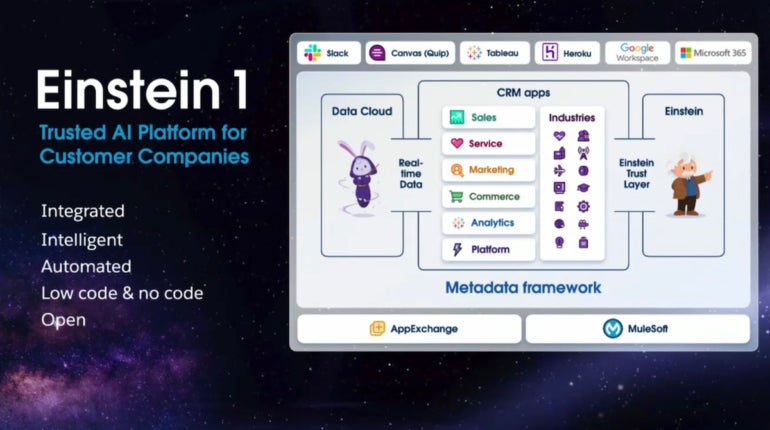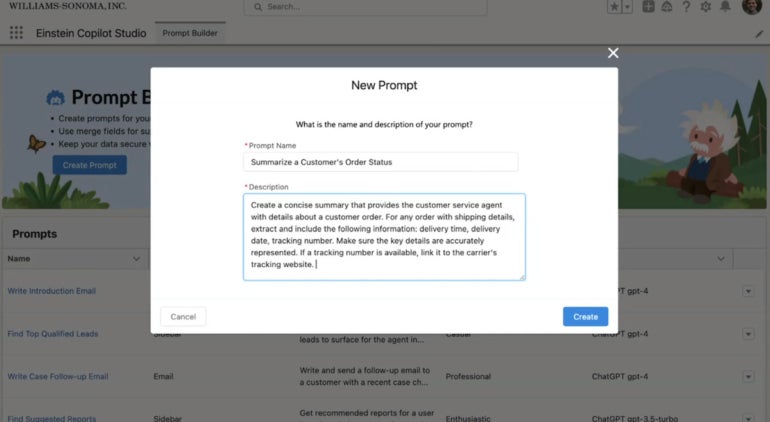- Zoom goes down across the globe - what we know about the outage so far
- AIがCXを加速:年間8600億ドルのビジネス価値創出の可能性、では導入の壁は?
- Free IRS Direct File service for taxpayers to end, according to reports
- Why the CVE database for tracking security flaws nearly went dark - and what happens next
- How to achieve a perfect AI face swap using Midjourney
Dreamforce 2023: Salesforce Expands Einstein AI and Data Cloud Platform

Salesforce announced a rebrand of its Einstein 1 Data Cloud and new capabilities for the Einstein generative AI assistant for CRM at the Dreamforce conference held in San Francisco on Tuesday, Sept. 12.
Salesforce’s Einstein 1 Data Cloud metadata framework will be integrated within the Einstein 1 Platform. The CRM giant also plans expanded capabilities for the generative AI assistant Einstein GPT, released in March, under the umbrella of the Einstein 1 Platform.
Jump to:
Data Cloud integrates into Einstein 1 Platform
Einstein 1 is “a relaunch of our Salesforce platform to create a trusted AI platform for our customer companies,” said Patrick Stokes, executive vice president of product and industries marketing at Salesforce, in a press briefing in advance of Dreamforce (Figure A). The Einstein 1 Platform contains all of Salesforce’s customers’ own data, enabling the generative AI capabilities to learn from and generate new content from that data.
Figure A

Einstein 1 unifies data into one customer record usable across the entire Salesforce platform, including Sales Cloud, Service Cloud, Marketing Cloud and Commerce Cloud.
Helping companies use data they already have
Combining different Salesforce cloud products under the Einstein 1 name helps enable companies to find uses for the data they already collect, said Muralidhar Krishnaprasad, executive vice president of engineering, Salesforce Marketing Cloud, in an interview with TechRepublic.
“We look at CRM and AI data as being a loop,” said Krishnaprasad. “Your CRM (and) your engagement (with) your customers is going to be better if you use more AI, particularly generative AI. You can have personalized experiences, but that AI is only good if you have the right data.”
“We look at it as a cycle where CRM generates a lot of data, and you have other enterprise data. You mix it, you use AI to generate the right personalized things, (and) you feed that back in your engagement,” he said.
In a press release, Parker Harris, co-founder and chief technology officer at Salesforce, referred to the ways data and AI can work together.
“We pioneered the metadata framework nearly 25 years ago to seamlessly bridge data across applications. It’s the connective tissue that fuels innovation,” said Harris. “Now, with Data Cloud and Einstein AI native on the Einstein 1 Platform, companies can easily create AI-powered apps and workflows that supercharge productivity, reduce costs and deliver amazing customer experiences.”
Salesforce introduces the generative AI assistant Einstein Copilot
Salesforce is joining the AI assistant trend with Einstein Copilot, a natural-language chatbot that will sit inside every Salesforce application. Einstein Copilot can help sales, service or commerce workers write emails, prepare for meetings, handle customer calls or pull up the right Tableau dashboards; it does so by using an organization’s data on its customers stored in Salesforce Data Cloud.
“It’s really about going from clicking through navigation to get to the information you’re looking for … to simply being able to ask for it through natural language,” said Clara Shih, chief executive officer of Salesforce AI, during a press briefing.
The Einstein Platform already draws on 10 years of innovation based on predictive capabilities, said Stokes.
“We wanted to put our foot in the door there and see how well that would work and what kind of data we would need to connect into the prompt to provide a useful generation [generative content],” Stokes said.
Copilot was born out of that lineage, but it’s different because it can respond in natural language and conversational style and sits within the dashboards of Sales Cloud and Service Cloud. Einstein Copilot can interpret data from Tableau, assist sales personnel in making deals, summarize content, turn natural language instructions into code in the programming language Apex and write email.
Einstein Copilot will be available to every Salesforce user across every cloud, extending the capabilities of Einstein GPT.
Einstein Copilot Studio lets organizations customize generative AI content
The admin portal for Einstein Copilot will be Einstein Copilot Studio, through which organizations can customize the chatbot for their specific prompts, skills and AI models (Figure B).
Figure B

Einstein Copilot Studio is made up of three major sets of tools: Prompt Builder, Skills Builder and Model Builder. The tools will help Salesforce customers tailor their AI-assisted communications to their brand’s needs and voice.
- Prompt Builder adds customizations and can A/B test versions before rolling them out to the service team.
- In Skills Builder, company admins can control and designate which workflows they want the copilot to be able to access. Companies that already have customer workflows on Salesforce will be able to select them in Skills Builder.
- Model Builder lets companies either bring their own AI model (from Anthropic, Cohere, Databricks, Google Cloud’s Vertex AI or OpenAI) or use one of Salesforce’s proprietary large language models. Either way, the selected models can be trained on Data Cloud.
Einstein Trust Layer addresses security concerns
Salesforce announced during the press briefing that Einstein Copilot and Copilot Studio will work in concert with the Einstein Trust Layer, a Salesforce-native AI architecture designed to keep proprietary information secure. The Einstein Trust Layer was first announced in June.
The Einstein Trust Layer ensures no customer data is used for large language model training. It prevents toxicity, masks personally identifiable information and creates an auditable trail of data about what Einstein Copilot does.
SEE: Salesforce’s guidelines for reducing AI bias (TechRepublic)
The Trust Layer includes feedback on whether AI-generated emails are actually helping businesses improve. For example, if sales or service workers tend to ask the AI to generate content but then heavily edit or do not use that content, the Trust Layer is where admins can access that information and fine-tune the AI based on how Einstein Copilot is being used in the real world.
“We are constantly experimenting in terms of the right models to use for the right job, what versions to use and also (how to) optimize on cost,” Krishnaprasad said. For example, it’s important to show admins when the AI is not being used so they can change the temperature settings or make other adjustments to make the output more appealing.
Krishnaprasad noted that companies wanting to get into generative AI should ask whether they have the right data in place already. Data is key because it lets a generative AI personalize responses.
Krishnaprasad said potential generative AI buyers should ask:
- “Where should I be putting my generative AI?”
- “How much of that data should I expose?”
- “What brand voice do I want for it?”
Company leaders looking to use generative AI should experiment and optimize, which the Trust Layer allows them to do, Krishnaprasad added.
“Look at the feedback, because what you think is the right thing may not be what your consumers think is the right thing,” he said.
When will Einstein Copilot, Einstein Copilot Studio and Einstein Trust Layer be available?
Copilot, Copilot Studio and Trust Layer are coming out as pilot tests this fall, Salesforce said. A general availability date has yet to be announced.

